| Brand Hub
Messaging
guide
This guide can be used to write content for UoG. It includes examples of our new messaging house in action, guidance on how to use our brand proposition, tone of voice and our dos & don’ts for copywriting.
Brand proposition: Meet every ambition
The proposition is the ‘big idea’ that sits behind everything we create. It is our unique selling point as a university and what sets us apart from competitors.
It has been developed with students for students, with a focus on careers and ambitions for their university experience.
At University of Gloucestershire, we support ambition in all its forms.
Fitting in and making friends, trying something new, or achieving all you can in your degree and finding your dream job.
Gain the confidence and drive to succeed.


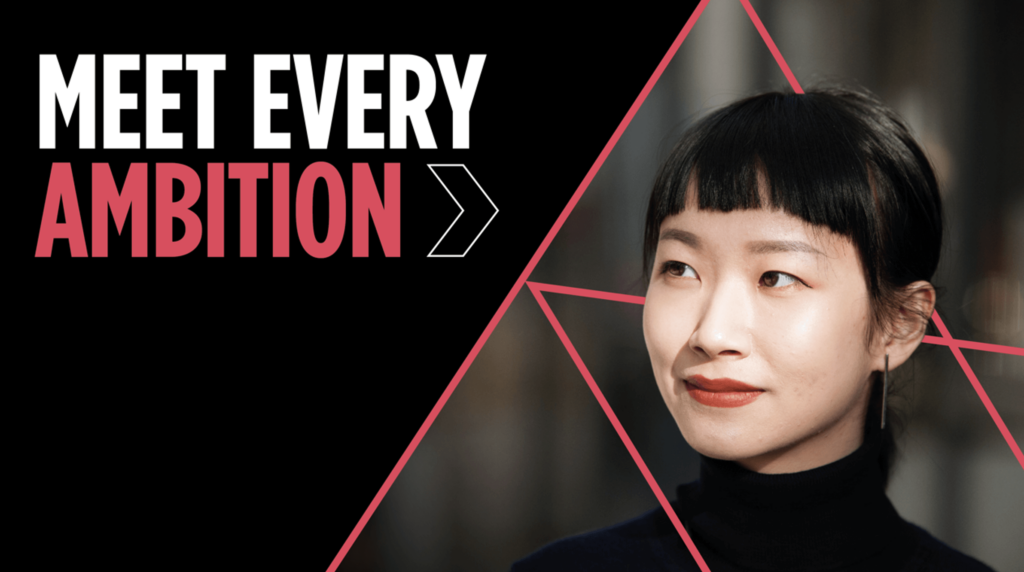
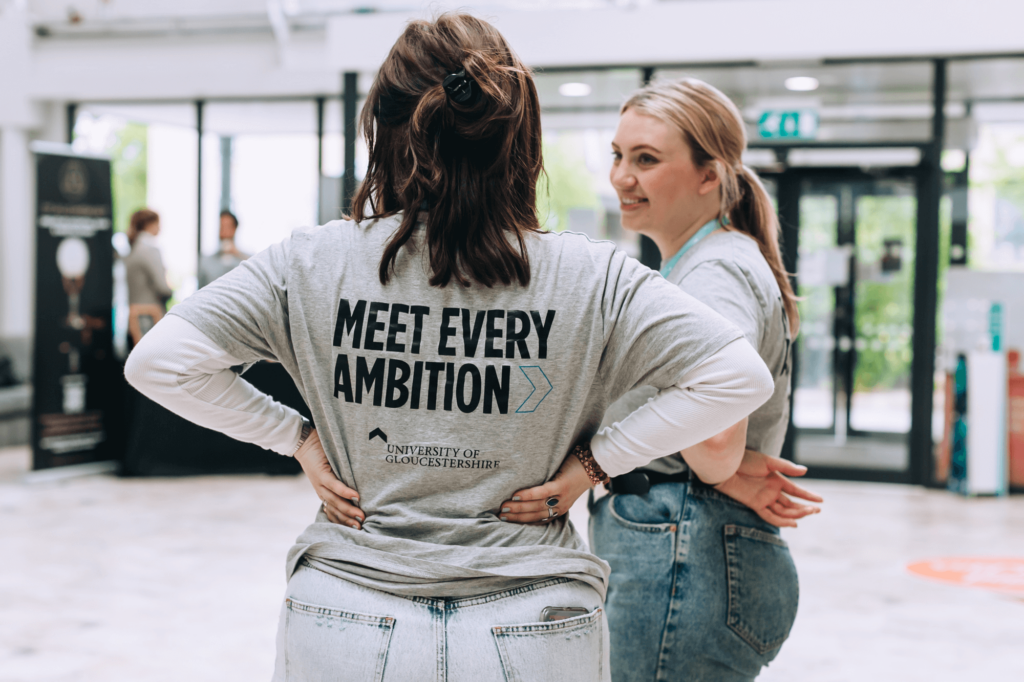

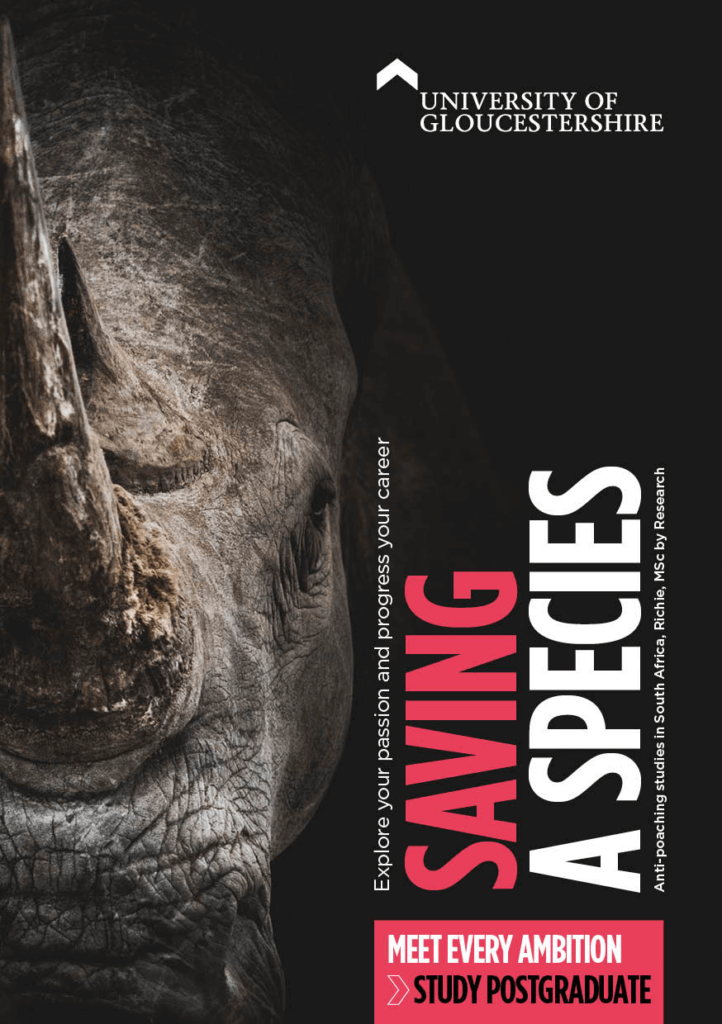
narrative pyramid
We should strive to talk about one big idea in our messaging and creatives. It’s overwhelming and confusing when we try to showcase too much.
This is a useful tool for drawing out key themes in our content, and tailoring the messaging and creatives.
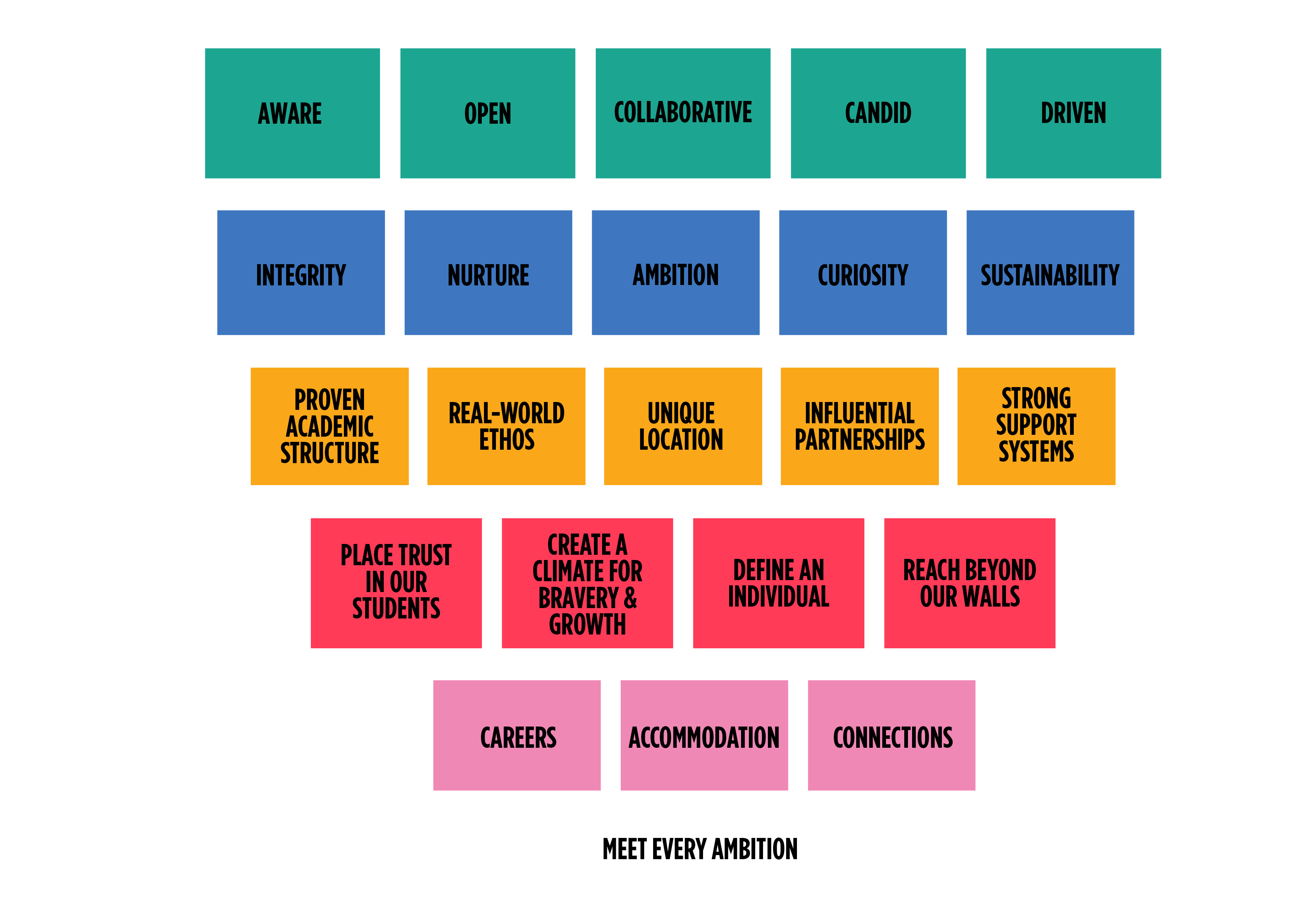
We are: aware, open, collaborative, candid and driven
We value: Integrity, nurture, ambition, curiosity and sustainability
We have: proven academic structure, real-world ethos, unique location, influential partnerships and strong support systems
We are able to: place trust in our students, create a climate for bravery & growth, define an individual path and reach beyond our walls
We promise: careers, accommodation and connections
Because here you: meet every ambition
We are aware
Actively working with purpose, we are aware of (and driven by) the needs of individuals, industries and the wider world.

We are open
Acceptance and inclusivity sit at our core. We celebrate individuality, new ideas and constructive endeavour.
We are candid
We seek opportunities to encourage productive debate, honest reflection and meaningful action.
We are collaborative
We engage with industry and communities beyond our own, reaching out to others who share our passion for betterment.
We are driven
Energised by challenge, we strive to excel in our disciplines through experiences that push attainment and a life–long ability to learn.
We value ambition
We encourage and inspire ourselves and every individual in our community to be the best they can.

Curiosity
We encourage questioning, open debate, and freedom of speech and inquiry.
Sustainability
We’re committed to reducing our environmental footprint and to protecting the viability of our community and the wider world.
Integrity
As individuals and a community we act honestly and openly, upholding fundamental academic and ethical values.
Nurture
We recognise the unique value and worth of every individual, and their contribution to our community.
We have proven academic structure
Curricula informed by and developed in collaboration with industry — reinforced by our staff’s professional experience & knowledge.

Real-world ethos
Specialist environments within which real–world learning and expertise can thrive – and profession-ready graduates emerge.
Unique location
Over 45 festivals each year, placements with global businesses on your doorstep and over 500 bars, clubs and pubs — set in the UK’s largest Area of Outstanding Natural Beauty.
Influential partnerships
Our connections with professional bodies and organisations enable us to run ambitious projects and produce pioneering work.
Strong support systems
Find community at our inclusive campuses. Care of our students is core to how we operate and we ensure wellbeing is embedded within everyday life here.
We are able to place trust in our students
Trust is intrinsic here. We give our students the space to question, develop, and define their expertise, identity, and the future they aspire to.

Create a climate for bravery & growth
A spirit of experimentation, openness and ambition pervades here — instilling confidence and agency in our students, so that they flourish personally and professionally.
Define individual paths
The future–facing learning experience we provide fosters individual aspirations in our students and empowers them to define their own path.
Reach beyond our walls
As a multidisciplinary community, our interactions and expertise reach beyond our walls — where we connect and collaborate to have positive impact on the world.

We promise careers
If you’re not in a job 6 months after graduating, we’ll guarantee 6 months of free support, a paid internship* and lifetime career coaching.

We promise accommodation
We guarantee our first year students accommodation on, or near, the campus you’re studying at.

we promise connections
With over 4,000 placements, internship opportunities and over 60 societies to join – we have the connections to meet your ambitions.
*terms apply, view eligibility criteria
Tone of voice
As well as consistent narratives, it’s important our tone of voice is the same across all content. It helps us build brand presence and shape our identity.
Be honest & authentic
Try to avoid marketing jargon and back up any statements with evidence ie stats or student quotes.
Be conversational
Especially when talking to prospective students, or our current cohort. Content should be easy to read and not too formal.
Be concise & impactful
Try not to overload content with lots of different points and supporting info. Talk about one topic at a time and keep content as short as possible.
Dos & Don’ts
The following guidance has been created with our UK home audience in mind. We appreciate some flex may be required for other audiences such as international and postgraduate, as well as corporate comms and copy for internal staff.
Capitalisation
The following words should always be lower/sentence case:
- am/pm
- academic schools (general term)
- applicant days
- biology labs, sports labs
- campus eg ‘our campuses’
- clinical skills suite
- degree apprenticeships
- doctorate
- eg, etc
- foundation degree
- government
- halls, halls of residence
- higher & degree apprenticeships
- library
- open days
- sports arena
- student records
- subject areas eg ‘our accounting & finance courses’
- undergraduate
- universities (in general)
- year 12 (year groups at school)
The following words always have some form of capitalisation. Either all caps/initial caps:
- A levels
- Blackfriars halls of residence
- BTEC
- Business school (building)
- City Campus
- Clearing
- course titles eg ‘Accounting & Finance’ or ‘BA (Hons) Accounting & Finance’
- FCH/Francis Close Hall Campus
- Gloucestershire Business School
- Helpzone
- Media Centre
- Module titles eg ‘TV & Video Journalism’
- MyGlos
- National Insurance Number
- NHS
- Oxstalls Campus
- Park Campus
- Pittville Student Village
- Staffnet
- SU/ Students’ Union
- Teaching Centre
- team names eg ‘Creative Team’
- UoG/ University of Gloucestershire/ The University
- YFP/ Your Future Plan
Always spell acronyms out in full, with the acronym in brackets for the first time you use it. No full stops.
The only exceptions are for organisations that are so universally well-known that there’s no need to explain:
- BTEC
- NHS
- UoG (lower case o)
Everything, unless specified on this page, should always be sentence case.
Initial Caps Are Harder To Read, so should only be used for proper nouns.
The only exception is our Gotham Condensed font, which requires everything in ALL CAPS.
Punctuation
Use for academic schools and course names, eg ‘School of Business & Technology’.
Only use these to indicate ownership or a contraction – never in plurals.
- Dos and don’ts
- the University’s
- FAQs
- Students’ Union
(If it’s a full sentence, the full stop is inside the brackets.) In a sentence that contains a detail in brackets, (the full stop is after the brackets).
(If it’s a full sentence, the full stop is inside the brackets.) In a sentence that contains a detail in brackets, (the full stop is after the brackets).
For bullets after headings, you don’t need a colon. If they’re full sentences, use a capital letter and full stop.
If each bullet continues the introductory sentence:
- use a colon
- start each point lowercase
- end the last point with a full stop.
In general, less is more. Only use commas where they’re needed — or a dash if it fits better. If you’ve added a lot of commas because a sentence is too long, see if you can rephrase your writing into shorter sentences.
In a list format wherever possible — though can embed in a sentence if it fits in naturally.
Make your writing sound more conversational — you’re, you’ll, we’ve, it’s, you’d, they’re etc.
Use 2.1 rather than 2:1.
Lowercase, even at the start of a sentence. No full stops
No more than 3… but try not to use in copy, as it makes us sound a bit out of touch.
Avoid these — they look try‑hard.
Do make these bold, underlined and accessible. Never write ‘click here’ because screen readers won’t be able to tell where the link is going.
For printed materials, you’ll need to include the URL, but remove ‘https://’ and ‘www’ which aren’t needed eg: glos.ac.uk/clearing
- cooperation
- cutting‑edge
- full‑time
- industry‑standard
- international standard
- log in with your login details
- MyBills
- MyGlos
- online
- part‑time
- postgraduate
- Pro‑Vice‑Chancellor
- real‑world experience
- undergraduate
- up‑to‑date
- timetable
- Vice‑Chancellor
- wellbeing
- world‑class
Only use for disclaimers.
‘Single’ for quotes, ”double” for speech.
Asking questions like, ‘So you’re thinking about uni?’ always make us sound a bit outdated. Try bold, brand messaging instead from this guide.
These are formal and best avoided — use dashes where needed.
Number and times
Always write these in list format rather than embedded amongst the copy. It’s much harder to read.
W: web address
E: email address
T: telephone no.
A: address/try to put this as link to Google maps in digital content for ease.
Always in the format 15 April 2023 (never 15th). Or if space is limited, 15.4.23
Amounts written in their variations as follows:
- £15million or £15m (not 15 million
pounds) - £3,000
- £415.65
- 15p
Can be abbreviated if there isn’t enough space eg ‘Term starts 15 Sept’.
In most cases numbers should always be written numerically. The only exceptions are if numbers are being used conversationally, eg ‘one of the ways’.
Or if there are too many numbers and you need to differentiate — eg ‘you’ll have two assessments in Semester 1 and three in Semester 2’.
Add commas — eg 1,000 or 200,000.
In general, try to use just the number of referencing a page number in an index or contents page. The same for numbers marked on a page.
When referencing a page number from a source this can be either page 9 or p9, no need for full stops after these.
Always use the symbol % never write it out in full and try to always round to the nearest decimal point.
With a space after the first 5 digits — 01242 714700 or +44 (0)1242 714700 for international audiences.
If digital, hyperlink the phone number so users can click the number to get in touch.
These are not 24 hour. Use a full stop rather than a colon if needed.
- 10–11.30am
- 10am–4pm
- We’re open 9am–5.30pm Monday
– Friday
Spelling & useful terms
Don’t say ‘academics’ — say ‘lecturers’ or ‘experts’ instead.
Not ‘advisor’, which is the American spelling.
In general, use ‘affect’ as a verb and ‘effect’ as a noun.
- 3D effects
- Cause and effect
- Does applying through Clearing affect my student loan
- Understand and how design affects reliability
Don’t use cliché phrases and words like ‘passionate’ and ‘inspiring’. All universities say these, whereas we could be describing a lecturer’s specialisms or a student’s achievements instead.
Avoid ‘ize’, which is the American spelling.
Don’t use industry jargon — some may be new to higher education, and using jargon doesn’t help to make it feel accessible to them.
Avoid internal jargon like Academic Registry, Estates or LTI. Say ‘staff’ instead, or if necessary, say ‘our Estates Team’ etc rather than just ‘Estates’.
Use ‘fewer’ to refer to people or things in plural — or ‘less’ for things that can’t be counted or don’t have plurals.
- Fewer applicants
- Fewer students
- Less money
- Less time
‘License’ is the verb and ‘licence’ is the noun.
- Lecturers often actively practise in their areas of expertise.
- This guide is best practice in writing.
We are ‘University of Gloucestershire’
NOT
‘The University of Gloucestershire.’ Always referred to as University of Gloucestershire in the first instance, ‘the University’ in subsequent instances. Or UoG.
UoG is always used once we have been established or on social media. It always has a lower case ‘o’. ‘uni’ or ‘university’ is used if referring to all/other universities (Common Noun). ‘Uni’ can be used to help with sentence length.
While both are fine to say, we avoid ‘whilst’ because it’s more old fashioned and doesn’t sound conversational.
Keep these as short as possible and trackable when used in print.
Always write glos.ac.uk NOT https://www.glos.ac.uk
